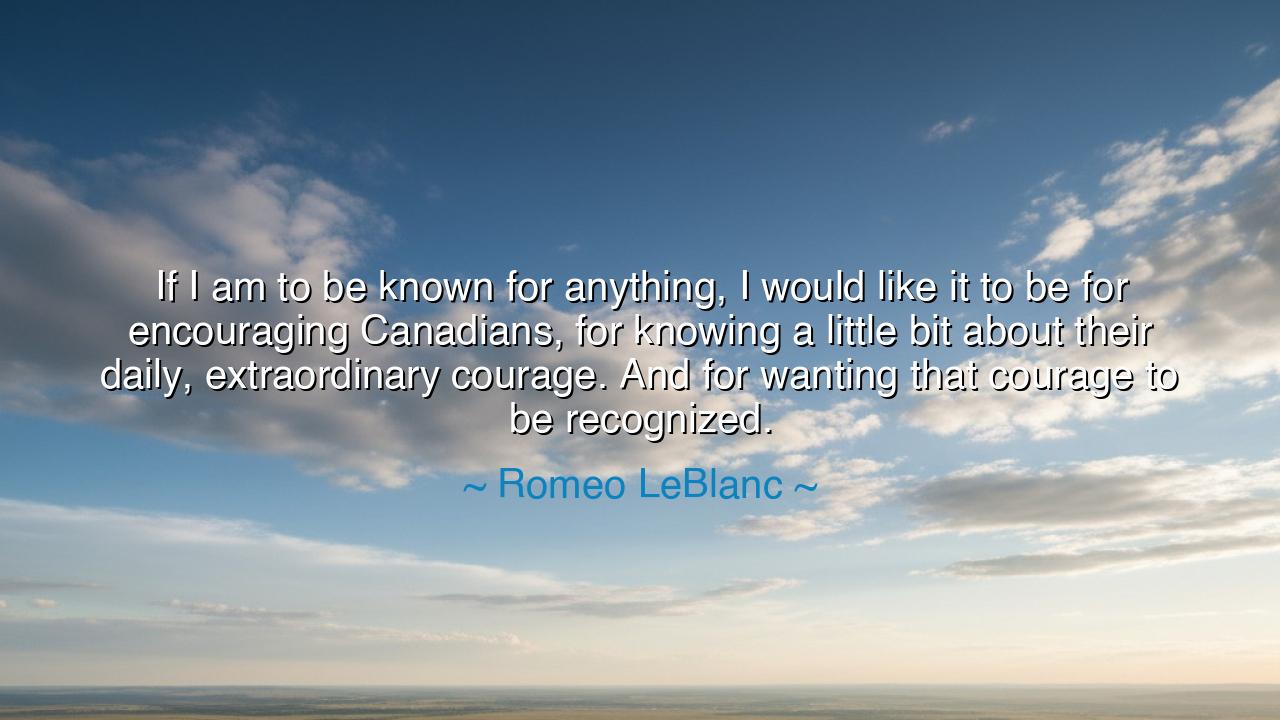
If I am to be known for anything, I would like it to be for
If I am to be known for anything, I would like it to be for encouraging Canadians, for knowing a little bit about their daily, extraordinary courage. And for wanting that courage to be recognized.






“If I am to be known for anything, I would like it to be for encouraging Canadians, for knowing a little bit about their daily, extraordinary courage. And for wanting that courage to be recognized.” Thus spoke Roméo LeBlanc, former Governor General of Canada, a man whose life was marked not by conquest or vanity, but by service and compassion. His words ring with the humility of one who saw greatness not in power, but in the quiet strength of ordinary people. In this reflection, LeBlanc reminds us that courage is not always the roar of battle or the thunder of triumph—it is often the steady heartbeat of daily life, the unseen valor of men and women who rise each morning to face hardship with grace.
LeBlanc’s insight is profoundly democratic, born of his deep love for his people and his nation. He had witnessed the fisherman in the bitter Atlantic cold, the farmer laboring beneath vast skies, the teacher shaping young minds in remote northern towns. These were not heroes of legend, yet their steadfast endurance, their daily, extraordinary courage, held a nobility as enduring as any written in the pages of history. He wished, above all else, to be a voice that recognized and uplifted this quiet heroism—to remind a nation that its true strength lies not in its monuments, but in its people.
In ancient times, philosophers and poets often sang of warriors and kings, but the wisest among them knew the deeper truth. Seneca, the Roman sage, wrote that courage is not the absence of fear but the mastery of it, and that such mastery may be found as much in a mother comforting her child as in a soldier upon the field. So too did LeBlanc perceive this balance—that heroism is not confined to the exceptional deed, but lives within the ordinary moment carried out with integrity. His was a vision of human dignity that transcends status, reminding us that every act of perseverance adds light to the world.
Consider the story of Terry Fox, a young Canadian who, after losing his leg to cancer, embarked on a run across his vast homeland to raise money for cancer research. His journey was cut short by illness, yet his spirit ignited a nation. Terry did not seek fame; he sought to serve. His courage was not dramatic—it was human, persistent, real. It was precisely the kind of courage LeBlanc celebrated: the everyday heroism of those who, though they may never see victory, still choose to fight. In Terry Fox, we see the living embodiment of LeBlanc’s ideal—a citizen whose ordinary act became extraordinary through purpose and compassion.
To recognize such courage is itself an act of gratitude and wisdom. Many walk among us who bear invisible burdens: the nurse who endures exhaustion to save lives, the immigrant who begins again in a foreign land, the elder who continues to hope in the face of loss. The world seldom sings of them, but their strength sustains civilization. LeBlanc’s wish—to be remembered for encouraging and acknowledging such souls—is a testament to his own nobility. He understood that societies remain alive not through wealth or warfare, but through reverence for the quiet, enduring spirit of courage in their people.
The lesson, dear listener, is this: do not seek greatness in the distant heights when it already lives within your hands and heart. Be mindful of the silent heroes around you, and within yourself. When you act with patience, honesty, and love despite difficulty, you, too, embody that extraordinary courage LeBlanc spoke of. And when you recognize it in others—when you give honor where the world gives none—you participate in a greater act of humanity, one that binds the strong and the humble in a single chain of light.
So, let us remember Roméo LeBlanc not only for his words but for his vision: that a nation’s truest wealth lies in its people, and that courage, though quiet, is the noblest inheritance of humankind. Let us walk as he did—with eyes open to the small acts of valor around us, with voices ready to celebrate them, and with hearts resolved to add our own measure of bravery to the common good. For when courage is seen, it multiplies; and when it is honored, it endures beyond lifetimes. And thus, by recognizing the daily, extraordinary courage of one another, we ensure that the spirit of greatness will never fade from our world.






AAdministratorAdministrator
Welcome, honored guests. Please leave a comment, we will respond soon